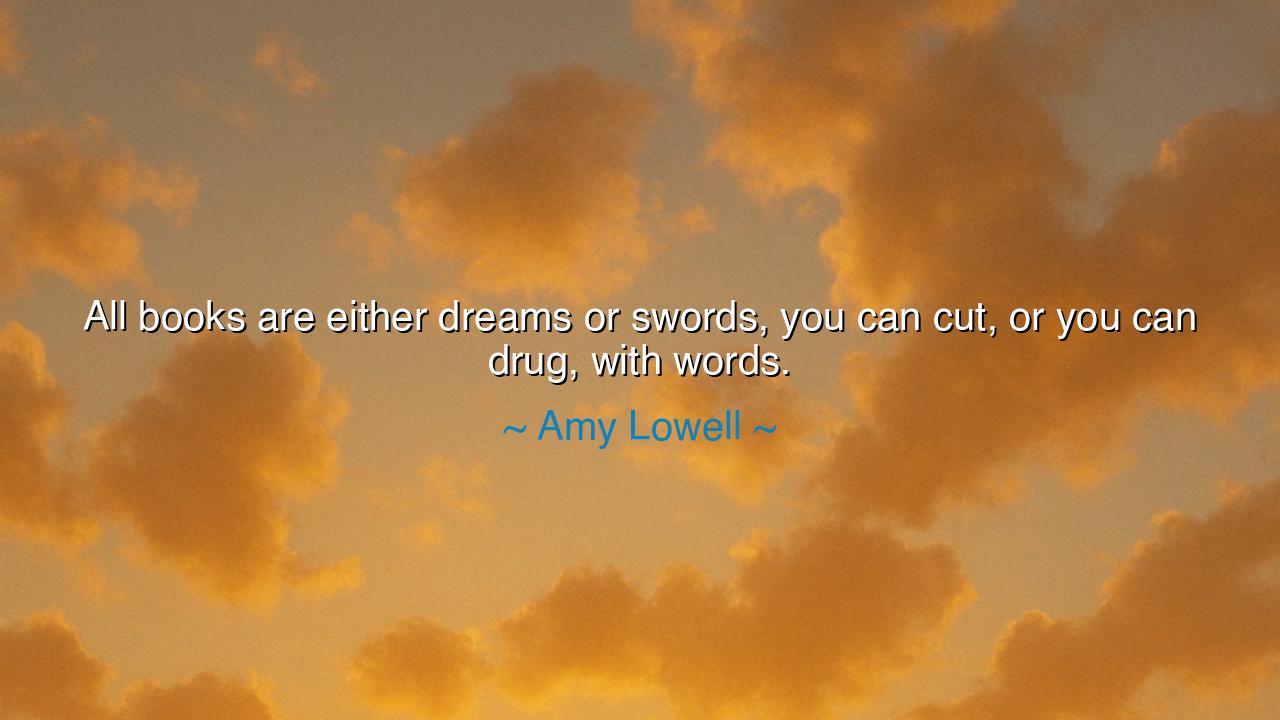
All books are either dreams or swords, you can cut, or you can






When Amy Lowell declared, “All books are either dreams or swords, you can cut, or you can drug, with words,” she spoke as one who understood the twin powers that dwell within language — its ability to heal or wound, to awaken or lull, to stir the soul or soothe it into silence. Her words are not a casual observation but a revelation: that every writer, every reader, and every speaker holds in their hands a weapon and a spell. For words are not mere symbols scratched upon paper; they are living forces, sharp as blades and deep as dreams.
Amy Lowell, an American poet of the early twentieth century, belonged to the Imagist movement, which sought to distill poetry to its purest form — precise, vivid, and elemental. She understood that language is both art and power. Her life was devoted to showing that words could be shaped not only into beauty but into transformation. In her quote, she divides all books — and by extension, all expressions of the written word — into two great realms: the sword and the dream. The sword is the book that challenges, provokes, cuts through deceit; the dream is the book that consoles, inspires, and lulls the mind into reverie. Both are necessary, both divine, but they are not the same.
To wield the sword of words is to speak truth without fear. Such are the writings of Voltaire, whose sharp wit cut through the hypocrisy of his age; of Frederick Douglass, whose fiery oratory sliced open the chains of slavery; of George Orwell, who used his pen to wound tyranny and awaken conscience. These are the writers who use words as weapons — not to destroy life, but to defend it. Their words are blades of clarity, cutting through illusion, exposing corruption, and forcing the heart to confront what it would rather avoid. Such books do not comfort; they demand. They call upon the reader to rise.
But not all truth comes through struggle. The dream has its own kingdom of power. The dreamers — the poets, the mystics, the visionaries — use words not to cut, but to heal and enchant. The stories of Hans Christian Andersen, the verses of Rumi, the songs of Walt Whitman — these do not strike; they soothe. They draw the reader into realms of tenderness and possibility, where imagination mends what reality has broken. These are the books that “drug” with words — not as poison, but as medicine, offering the sweet forgetfulness that allows the wounded heart to rest. The dream and the sword are not enemies; they are the twin halves of creation, the night and the day of the human spirit.
Lowell’s insight reaches beyond literature into the essence of communication itself. Every word spoken carries this dual potential. A phrase can cut or comfort, injure or uplift. The teacher’s rebuke can wound a young soul for life, while a single word of kindness can save one from despair. This is why Lowell’s wisdom burns with such urgency: she reminds us that language is not a tool but a living power, and that those who use it must do so with reverence. Words once uttered cannot be reclaimed — their echoes shape hearts, nations, and generations.
History itself has been forged by the sword and the dream. The Declaration of Independence was both — a dream of liberty and a sword against oppression. The Bible, the Quran, the Bhagavad Gita — all are both — guiding, wounding, healing, awakening. Every great revolution begins with a word; every age of peace begins with a story. The might of armies fades, but the written word endures. Empires fall to dust, but a poem can still ignite the soul a thousand years after the hand that wrote it has turned to ash.
And so, take this teaching into your life: guard your words, for they are sacred. When you speak or write, ask yourself — will this be a sword or a dream? Will it cut away falsehood, or will it soothe the weary heart? Do not fear either path, but walk them with awareness. Speak when truth must be told, and let your blade be clean. Dream when the world has grown too cold, and let your song be gentle. For as Amy Lowell teaches, the destiny of humankind is written not in stone, but in syllables — and every word you utter adds to the eternal chorus that shapes the world.
Thus remember: you hold the sword and the dream within you. Wield them not carelessly, but as the ancients wielded fire — to light the darkness, not to consume. For words are the breath of creation itself, and those who master them become, in their own way, creators of worlds.






AAdministratorAdministrator
Welcome, honored guests. Please leave a comment, we will respond soon